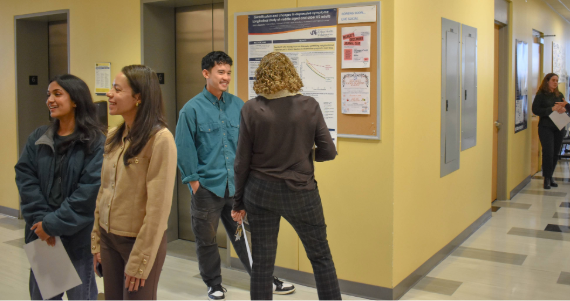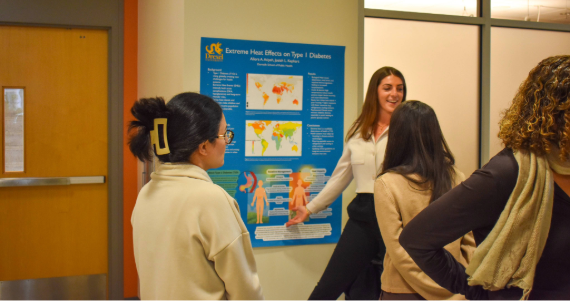Innovations in Urban Health Research on Display at This Year’s UHC Day
November 20, 2025
On November 12th, the Urban Health Collaborative (UHC) at the Drexel Dornsife School of Public Health hosted its annual poster day and open house, UHC Day. Over 85 people gathered to take part in an exposition that celebrates the work going on across the UHC in research, policy, community engagement, training, and other areas.
Much of what was on display from the more than 20 poster presentations was on the cutting edge of urban health research. Researchers presented on recent and upcoming publications on topics including the relationship between climate change and urban health, the built environment and urban planning, the social determinants of urban health, maternal and child health, and community engagement and research. Some highlights included:

UHC Faculty Member Alex Quistberg, PhD, MPH, presented on two different studies centered on the use of Artificial Intelligence in Urban Health research – one on assessing the quality of built environment features collected using AI and computer vision compared to data collected from other sources, and another on using community engagement and AI to understand how climate change affects health in informal settlements.
Staff member at the UHC, Stephen Dickinson, PhD, MPH, also presented their study done in partnership with the Drexel Medical Cannabis Research Center, investigating the relationship between marijuana dispensary location and equity in neighborhoods. In doing so, the project created the first nationwide longitudinal database of marijuana dispensaries, geocoded to a variety of geospatial levels.

Annaka Scheeres, MPH, a new UHC Doctoral Research Fellow, shared research co-led by her mentor Josiah Kephart, PhD, MPH for the YUCA Project. The project investigates how higher heat, brought about by factors like climate change, can affect the mental health of young people in urban areas across the Americas.
Doctoral Student Mark Hernandez, MPH, presented the findings of one of the aims of his dissertation. Hernandez investigated the relationship between gentrification and changes in depressive symptoms. To do so, he examined middle-aged and older US adults by way of a longitudinal study – a method which has rarely been associated with gentrification thus far in urban health research. He has also explored the use of quantitative studies – another method not frequently used in investigating the relationship between gentrification and health – to examine gentrification, fear of displacement, and health.
The UHC continues to develop new, impactful, and interesting ways to help improve health in cities. From creating an interactive tool to better understand Philadelphia neighborhoods to presenting at COP30 and calling for a new way to approach urban health in Nature Medicine, the UHC is committed to leveraging data, research, education, and partnerships to make cities healthier, more equitable, and environmentally sustainable. Keep up to date with the latest from us by subscribing to our newsletter.
Stay Connected